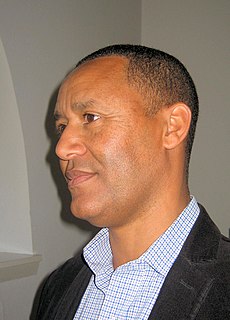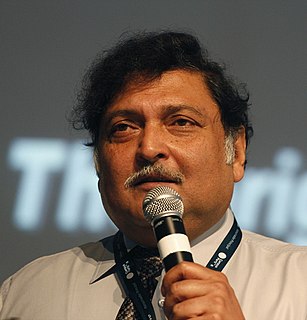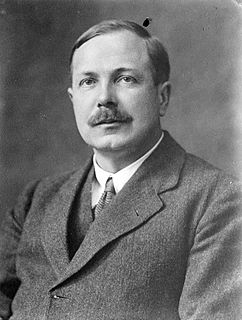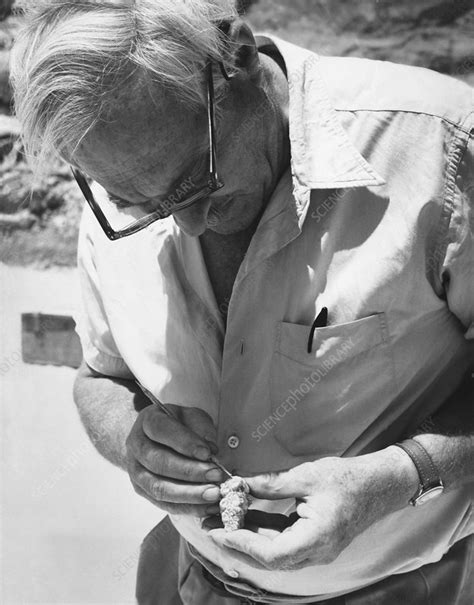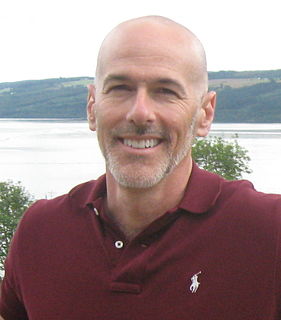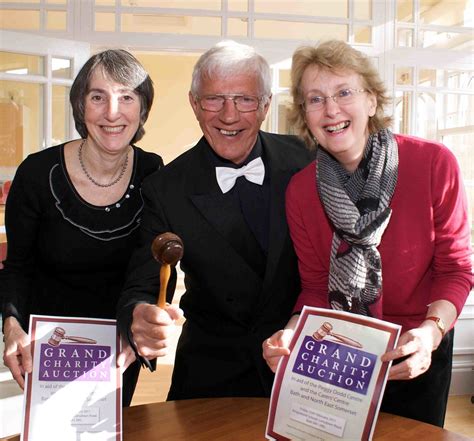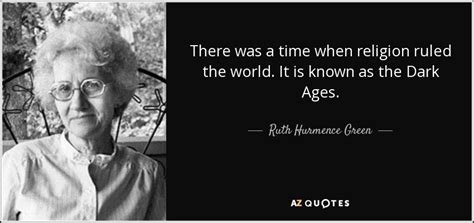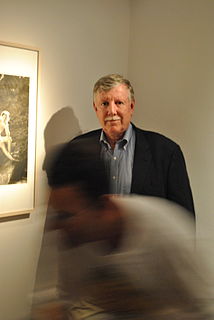Top 189 Homo Sapiens Quotes & Sayings - Page 2
Explore popular Homo Sapiens quotes.
Last updated on April 21, 2025.
I contend that the continued racial classification of Homo sapiens represents an outmoded approach to the general problem of differentiation within a species. In other words, I reject a racial classification of humans for the same reasons that I prefer not to divide into subspecies the prodigiously variable West Indian land snails that form the subject of my own research.
When homo sapiens is changing, it will not be by the whole race gaining simultaneously whatever qualities better fit it for survival, but rather by certain types of mankind proving superior to the rest in survival value, so that they contribute a larger proportion to the later generations, and in so doing drag the average qualities of humanity in the same direction.
We have come to look at our planet as a resource for our species, which is funny when you think that the planet has been around for about five billion years, and Homo sapiens for perhaps one hundred thousand. We have acquired an arrogance about ourselves that I find frightening. We have come to feel that we are so far apart from the rest of nature that we have but to command.
Human beings are not inevitable, and our brief existence is not preordained to be extended into the distant future. If Homo sapiens is to have a continued presence on earth, humankind will reevaluate its sense of place in the world and modify its strong species-centric stewardship of the planet. Our collective concepts of morality and ethics have a direct impact on our species' ultimate fate.
Every culture from the Egyptians to the Mayans to the American Indians to the Bedouins created bestiaries that enabled them to express their relationship with nature. Ashes and Snow is a 21st-century bestiary filled with species from around the world. Nature’s orchestra includes not just Homo sapiens but elephants, whales, manatees, eagles, cheetahs, orangutans, and many others.
Aberjhani's writing blows the mind and frees the psyche of any rigid assumptions about ancestral heritage. Here, our collective experience is starkly rendered. The transparency of one culture overlays another, and another, to form the daguerreotype of possibilities that is homo sapiens, interacting, almost like the elements themselves, with the created world and modified only by context and its imperatives.
A need to tell and hear stories is essential to the species Homo sapiens-second in necessity apparently after nourishment and before love and shelter. Millions survive without love or home, almost none in silence; the opposite of silence leads quickly to narrative, and the sound of story is the dominant sound of our lives, from the small accounts of our day's events to the vast incommunicable constructs of psychopaths.
We want to be special. We want our place in the cosmos to be central. We want evolution-even godless evolution-to have been directed toward us so that we stand at the pinnacle of nature's ladder of progress. Rewind the tape of life and we want to believe that we (Homo Sapiens) would appear again and again. Would we? Probably not.
The function of education has never been to free the mind and the spirit of man, but to bind them; and to the end that the mind and spirit of his children should never escape, Homo Sapiens has employed praise, ridicule, admonition, accusation, mutilation, and even torture to chain them to the culture pattern.
The most ridiculous concept ever perpetrated by Homo Sapiens is that the Lord God of Creation, Shaper and Ruler of the Universes, wants the saccharine adoration of his creations, that he can be persuaded by their prayers, and becomes petulant if he does not receive this flattery. Yet this ridiculous notion, without one real shred of evidence to bolster it, has gone on to found one of the oldest, largest and least productive industries in history.
If humans one day become extinct from a catastrophic collision, there would be no greater tragedy in the history of life in the universe. Not because we lacked the brain power to protect ourselves but because we lacked the foresight. The dominant species that replaces us in post-apocalyptic Earth just might wonder, as they gaze upon our mounted skeletons in their natural history museums, why large headed Homo sapiens fared no better than the proverbially peabrained dinosaurs.
When you think about what Homo sapiens are about, you almost feel that we are replacing ourselves. We won't be able to breathe and breed on this earth, so we replace ourselves with androids that can do. The androids can go up into space and take the future of humanity forward because maybe we just bow out with a carbon-based epoch.
Evolving life must experience a vast range of possibilities, based on environmental histories so unpredictable that no realized route - the pathway to consciousness in the form of Homo sapiens or Little Green Men, for example - can be construed as a highway to heaven, but must be viewed as a tortuous track rutted with uncountable obstacles and festooned with innumerable alternative branches. Any reasonably precise repetition of our earthly route on another planet therefore becomes wildly improbable even in a trillion cases.
Each day as I travel through downtown Tucson, I am amazed at how quickly the most ancient of human behaviors have changed. For as long as there have been Homo sapiens - roughly 200,000 years - people have filled their lives principally with two activities: talking directly with other people, and doing physical things.
The contingency of history (both for life in general and for the cultures of Homo sapiens ) and human free will (in the factual rather than theological sense) are conjoined concepts, and no better evidence can be produced than the "experimental" production of markedly different solutions in identical environments.
Maybe philosophical problems are hard not because they are divine or irreducible or meaningless or workaday science, but because the mind of Homo sapiens lacks the cognitive equipment to solve them. We are organisms, not angels, and our minds are organs, not pipelines to the truth. Our minds evolved by natural selection to solve problems that were life-and-death matters to our ancestors, not to commune with correctness ot to answer any question we are capable of asking.
In prehistoric times, Homo sapiens was deeply endangered. Early humans were less fleet of foot, with fewer natural weapons and less well-honed senses than all the predators that threatened them. Moreover, they were hampered in their movements by the need to protect their uniquely immature young - juicy meals for any hungry beast.
There is a further advantage [to hydrogen bombs]: the supply of uranium in the planet is very limited, and it might be feared that it would be used up before the human race was exterminated, but now that the practically unlimited supply of hydrogen can be utilized, there is considerable reason to hope that homo sapiens may put an end to himself, to the great advantage of such less ferocious animals as may survive. But it is time to return to less cheerful topics.
For more than a century, people have often thought that the conclusion to draw from Darwin's vision is that Homo sapiens, our species - and we're just animals too, we're just mammals - that there is nothing morally special about us. I myself don't think this follows at all from Darwin's vision, but it is certainly the received view in many quarters.
Possibly, over the course of time, the brain capacity of homo sapiens will have made such great progress, that complications as contained in this game can be fathomed instantly with a shrug and a smile. Then, not only will the game of chess have ceased to exist, but also will the remembrance of frequently missed objectives elicit pity, as a reaction to the shortcomings of a lower organized form of life.
We have become a plague upon ourselves and upon the Earth. It is cosmically unlikely that the developed world will choose to end its orgy of fossil energy consumption, and the Third World its suicidal consumption of landscape. Until such time as Homo Sapiens should decide to rejoin nature, some of us can only hope for the right virus to come along.
We call ourselves Homo sapiens--man the wise--because our intelligence is so important to us. For thousands of years, we have tried to understand how we think: that is, how a mere handful of matter can perceive, understand, predict, and manipulate a world far larger and more complicated than itself. The field of artificial intelligence, or AI, goes further still: it attempts not just to understand but also to build intelligent entities.
If we make this readjustment to view Homo sapiens as an ultimate in oddball rarity, and life at bacterial grade as the common expression of a universal phenomenon, then we could finally ask the truly fundamental question raised by the prospect of Martian fossils. If life originates as a general property of the material universe under certain conditions (probably often realized), then how much can the basic structure and constitution of life vary from place to independent place?
There are a variety of ways in which a wedge is driven between the reality of the world outside, the motion of atoms, and our conception of what is there. Some of it has to do with what we're told, some of it to do with sensibilities that might be described as cultural, some of it to do with habit, some to do with heuristics we, as Homo sapiens, invoke because we cannot do otherwise - to name just a few of the impediments.
There are definitely recurring themes in humanity's relationship with our environment. The biggest is probably adaptation, because humans are incredibly good at adapting to new environments in relatively short periods of time. The ancestors of Homo sapiens started leaving Africa over one million years ago, moving from warm, tropical climates into the freezing wilderness of Europe and the desert ecosystems of the Middle East.
None of the three great apes is considered ancestral to modern man, Homo sapiens, but they remain the only other type of extant primate with which human beings share such close physical characteristics. From them we may learn much concerning the behavior of our earliest primate prototypes, because behavior, unlike bones, teeth, or tools, does not fossilize.
My favorite quote: The land ethic simply enlarges the boundaries of the community to include soils, waters, plants, and animals, or collectively: the land. In short, a land ethic changes the role of Homo sapiens from conqueror of the land-community to plain member and citizen of it. It implies respect for his fellow-members, and also respect for the community as such.
Humans have existed only for the last 0.001 percent of cosmic time. All of which says that - unless the Homo sapiens brain is the one-and-only instance of cogitating machinery - nearly all the intelligence that's out there is beyond our level. And that intelligence is more than just a little bit beyond.
My own diagnosis of my problem is a simpler one. It's that I share 50 per cent of my genome with a banana and 98 per cent with a chimpanzee. Banana's don't do psychological consistency. And the tiny part of us that's different - the special Homo sapiens bit - is faulty. It doesn't work. Sorry about that.
My single greatest challenge is to remain centered and loving in an overwhelmingly nonvegan world. In today's world, cruelty and exploitation of other beings - human and non-human alike - are accepted, practiced, and profited from by most every institution of society - from commerce and science to education and entertainment. Unfortunately, the vast majority of Homo sapiens are either unaware of the cruelty or accept it as unavoidable and even normal.
The classical argument for why a supposedly decent and moral creature like Homo sapiens can mistreat and even extirpate other species rests upon an extreme position in a continuum. The Cartesian tradition, formulated explicitly in the seventeenth century, but developed in "folk" and other versions throughout human history no doubt, holds that other animals are little more than unfeeling machines, with only humans enjoying "consciousness," however defined.
What a curious picture it is to find man, homo sapiens, of divine origin, we are told, seriously considering going underground to escape the consequences of his own folly. With a little wisdom and foresight, surely it is not yet necessary to forsake life in the fresh air and in the warmth of the sunlight. What a paradox if our own cleverness in science should force us to live underground with the moles.

